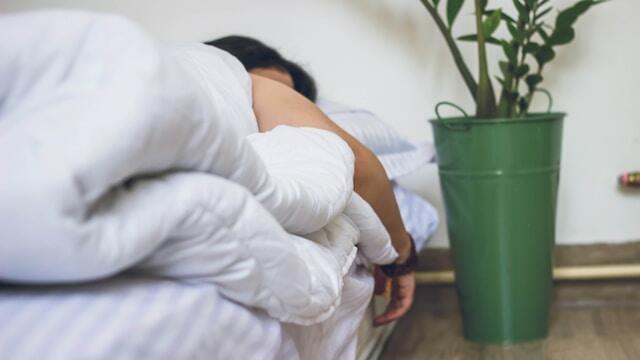Hey there, fellow sleep seekers!
If you’re reading this, chances are you’re keen to know how to sleep better.
Sleep has been something I was desperate to improve too.
The struggle was real, and my sleep quality took a massive nosedive.
But fear not, because I’ve discovered some game-changing tips that not only transformed my sleep but also left me wondering why I hadn’t implemented them sooner.
So, grab a cosy blanket and let’s dive into my ultimate guide on how to sleep better – because we all deserve those restful, rejuvenating nights.
Revamp your Sleep Sanctuary
First things first, let’s talk about your sleep haven – your bedroom.
Make it a haven for rest by decluttering and keeping it cool, dark, and quiet.
Invest in blackout curtains, ditch the electronic devices, and opt for a comfortable mattress and pillows that support your unique sleep style.
If your budget doesn’t quite stretch to a new mattress, a memory foam topper could also create the comfort you need.
A cool, comfortable, screen free bedroom is the perfect combination for a good night’s sleep.
No matter how tempted you are, do not pick up your phone or tablet even to check the time, as this could prevent you from getting to sleep or getting back to sleep if you wake up during the night.
Hydrate Wisely
Staying hydrated is crucial, but sipping on water right before bed can lead to disruptive bathroom trips.
Instead, make a habit of staying hydrated throughout the day and limit your fluid intake an hour or two before bedtime.
I’ve personally started sipping on a calming herbal tea like chamomile in the evenings, and it’s become a soothing ritual that signals to my body that it’s time to wind down.
If you are not a fan of chamomile, there’s lots of other drinks that are suitable before bedtime, I’m sure you’ll find something you like.
Establish a Consistent Sleep Schedule
Your body loves routine, and so does your sleep.
Set a consistent bedtime and wake-up time, even on weekends.
This helps regulate your body’s internal clock and improves the overall quality of your sleep.
I discovered that my body started anticipating bedtime, making it easier to fall asleep and I would also wake up feeling refreshed.
Move that Body
Exercise isn’t just for a toned physique; it’s a ticket to better sleep too.
I have discovered that incorporating physical activity into my daily routine really helps me sleep better. I try to wrap it up at least a few hours before bedtime, so I have a chance to wind down.
Whether it’s a brisk walk, yoga, or hitting the gym, find what works for you.
Not only did this help me fall asleep faster, but it also alleviated some of the hip pain that’s been disturbing my sleep too.
Mind Your Meals and Snacks
Ever heard the saying, “You are what you eat?”
Well, your sleep is no exception.
Avoid heavy meals close to bedtime and steer clear of caffeine and other stimulants.
Opt for a light, sleep-friendly snack if you’re feeling a bit peckish.
I found that a small serving of Greek yoghurt with a handful of nuts did the trick without leaving me feeling too full or uncomfortable.
Unplug and Unwind

We’ve all been guilty of scrolling through our phones or binge-watching Netflix in bed.
The harsh blue light emitted by screens can interfere with melatonin production, making it harder to fall asleep.
Create a pre-sleep routine that involves relaxing activities like reading a book, taking a warm bath, or practising mindfulness meditation.
I’ve found that this not only improved my sleep but also eased the tension in my body, aiding a more restful sleep.
Tackle Hip Pain Head-On
Speaking of tension, my hips have been really suffering lately.
Once I’d improved my bedtime routine, I realised that hip pain has also been affecting my sleep.
Incorporating gentle hip stretches into my daily routine, along with investing in a supportive pillow, has made a significant difference.
If you’re experiencing similar discomfort, consult with a healthcare professional to find personalised solutions.
I discovered that seeing a physiotherapist was really helpful, and I now have some targeted exercises that have helped my hip, and indirectly improved my sleep.
Limit Naps
Napping can be a double-edged sword.
While a short power nap can provide a quick energy boost, napping for too long or too late in the day can interfere with nighttime sleep.
If you need to nap, keep it short (20-30 minutes) and aim for the early afternoon.
Mind Your Mindset
Stress and worries can easily sneak into your bedtime routine, making it challenging to relax.
Practice stress-reducing techniques like deep breathing, progressive muscle relaxation, or journaling before bed.
I’ve started keeping a gratitude journal, jotting down a few things I’m thankful for each night, and it’s surprising how much it eases my mind.
Seek Professional Help if Needed
If despite all your efforts, sleep remains elusive, it might be time to seek professional help.
Consult with a sleep specialist or healthcare provider to rule out any underlying issues and explore tailored solutions.
In conclusion, my journey to better sleep has been transformative, and I’m here to let you know – better sleep is within your grasp!
Implement these changes gradually, be patient with yourself, and watch as your nights become a haven of rest and rejuvenation.
You might discover, like me, that once you’ve made some changes there is an underlying problem disrupting your sleep pattern.
Once you become aware of the issues affecting your sleep, you can take the most appropriate steps to improve them.
Sweet dreams, sleep warriors.
Here’s to better sleep for all!
Need more sleep tips? Check this out next: 50 Useful Tips For How To Get To Sleep







